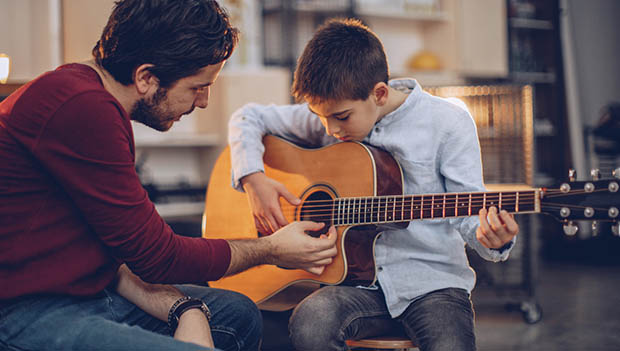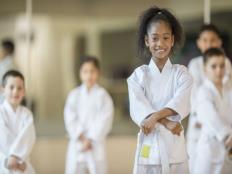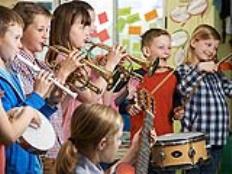
Music lessons have long been a staple in a developing child's life. Sometimes a love for music and desire to learn how to play an instrument is passed down from a long line of musicians in the family, but other times they might be the first one to pick up a guitar or a microphone.
No matter your child's background, one thing's certain: Music lessons can change lives. From creativity and mathematics to learning to write and cut out shapes with scissors, learning to play and understand a musical instrument draws on skills that affect all aspects of life.
But let's face it, music lessons are a serious commitment. Not only do you have to pay for the lessons and the instrument itself, but it takes time with practice schedules, lessons and recitals to keep track of.
So why should you invest in music lessons for your child? What are the benefits?
From boosting fine motor skills to learning how to collaborate creatively, we've highlighted some of the major skills that music lessons emphasize, as well as the ways in which they can positively affect your child as they go from the practice room to the classroom to the recital stage and beyond.
Fine Motor Skills
Pressing the keys down on the piano, holding strings down on the guitar, violin or cello and positioning fingers over the keys correctly on a flute all require fine motor skills—the ability to operate the smaller muscles in the hands and forearms with precision.
Developing fine motor skills in the classroom involves such things as holding and maneuvering a pencil to write and draw, coloring in the lines and working with other small tools like scissors to cut out shapes and patterns.
Coordination
Most instruments require multiple movements at once. For example, the piano typically requires playing a chord with the left hand and a melody with the right. A stringed instrument requires pressing down with one hand and strumming, bowing or plucking the strings with the other. All of this requires coordination—the ability to plan, process and execute multiple movements for a single outcome.
In the classroom this can be as simple as handing something to someone while continuing their task at hand or executing science experiments safely. But coordination is valuable in other areas too, especially in athletics with dribbling, hitting, kicking and more.
Pattern Identification/Problem Solving (Math Skills)
Once your child has learned how to control the sound that comes out of the instrument, the process of learning how the written music relates to their instrument and the sounds it makes begins.
When learning to read music, students have to learn how specific shapes and symbols have specific rhythmic meaning. To be able to read a piece of music requires the ability to count (one of the earliest mathematic skills addressed in a classroom).
Understanding time signatures relates directly to understanding fractions and how a bar of music is broken down. More generally, using symbols to interpret, respond to and understand a message requires strong problem-solving, perseverance and memory skills—all valuable in developing number sense and fact family math comprehension in the early grades.
Literacy Skills (Rhyme) and Other Language Skills (Reading and Comprehension)
The signs and symbols written into a piece of music are not entirely mathematic, but to each there is sound and meaning. This is similar to the alphabet; in a child's earliest formal education years, they are learning the name and sound of each letter. Building on this, they start to understand that sounds can work together to create blends (some with meaning, like prefixes and suffixes and words).
Music is no different. Each note represents a sound, and when they work together they create a new sound with meaning. Oftentimes, music is used in the classroom to help students remember things (songs about the seasons, months and days of the week), and music and language go hand-in-hand.
The more familiar a student is with patterns in music the more connections they'll make with patterns in language and vise-versa. The more connections they make the better; connections equal learning!
Cultivates Social Skills and Collaboration (Communication)
Music is a form of communication, and to really perform a piece or record it requires an endless list of people to make it happen. Learning to play an instrument will present opportunities for your child to work with and understand others from different backgrounds.
Developing an interest in music opens up windows into other cultures as your child will explore and learn music from various genres, artists and origins. Knowing music will create a common ground with others and give them something to relate to and talk about. They may also find themselves in a band or ensemble once they've mastered the foundations of their instrument.
When it comes to the classroom, working together and having the ability to consider multiple perspectives is a skill that will help your child succeed and lead in group work and problem solving situations throughout their life.
Develops Discipline (Time Management)—Perseverance
Learning to juggle the hours of practice that any musical instrument demands with classwork, family time and a growing list of commitments as your child gets older is a skill that will serve them well for years to come.
The time that goes into the earliest days of learning an instrument can feel like a battle as it will be frustrating and challenging; at some point they will want nothing more than to give up and stop trying. However, persevering and practicing enough to see and celebrate improvements translates directly to the classroom.
The pace of instruction can be fast, and concepts will be challenging at times, but a resilience to working through mistakes and setbacks will better ensure success. If a child sees these frustrating experiences as a part of the learning process, they'll find themselves successful no matter the challenge they face.
Self-Expression and Esteem (Creativity) and Improvisation
Finally, learning to read and play music will give your child another window into understanding the world around them and how they choose to express themselves within it.
Knowing how to read music and play an instrument opens up ways of creatively expressing themselves, from the music they select to the songs they write. Oftentimes music lessons build up to some kind of recital or performance in which your child will be challenged to showcase their work. Building up to this moment builds confidence and pride in the work they put into learning, practicing and refining their skills.
The classroom is no different. The goal is for students to take risks and take pride in their work as an expression of their understanding and progress. There's no better way to teach and embrace this than by encouraging your young learner to stick with an instrument—this will follow them well into their adult years and be a part of what helps them define and embrace their wonderfully unique self!
READ THIS NEXT: Is Your Child Ready for Music Lessons?









Discuss This Article